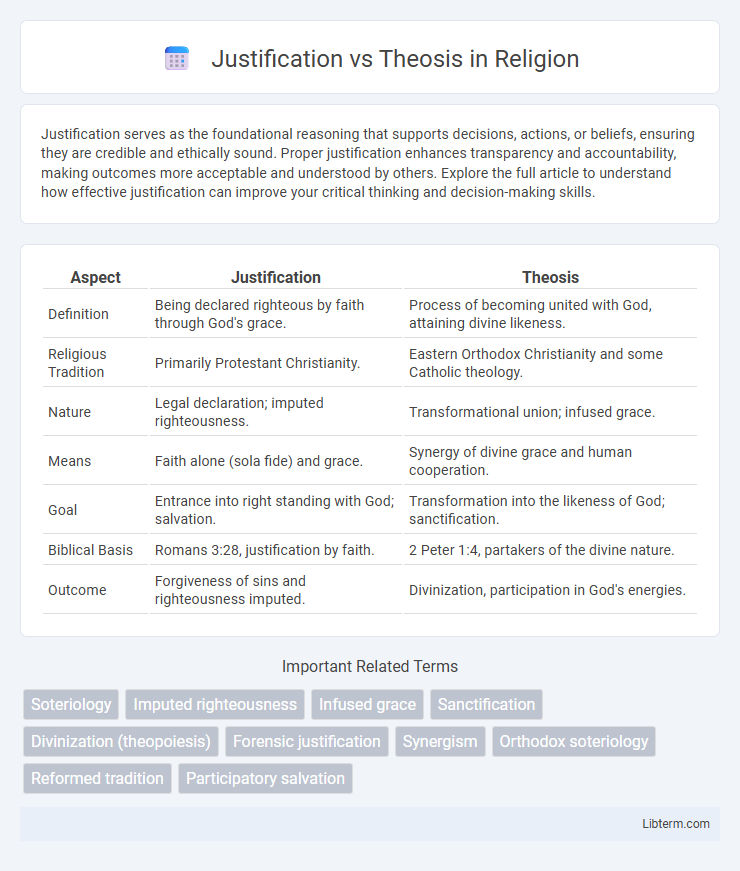Justification serves as the foundational reasoning that supports decisions, actions, or beliefs, ensuring they are credible and ethically sound. Proper justification enhances transparency and accountability, making outcomes more acceptable and understood by others. Explore the full article to understand how effective justification can improve your critical thinking and decision-making skills.
Table of Comparison
| Aspect | Justification | Theosis |
|---|---|---|
| Definition | Being declared righteous by faith through God's grace. | Process of becoming united with God, attaining divine likeness. |
| Religious Tradition | Primarily Protestant Christianity. | Eastern Orthodox Christianity and some Catholic theology. |
| Nature | Legal declaration; imputed righteousness. | Transformational union; infused grace. |
| Means | Faith alone (sola fide) and grace. | Synergy of divine grace and human cooperation. |
| Goal | Entrance into right standing with God; salvation. | Transformation into the likeness of God; sanctification. |
| Biblical Basis | Romans 3:28, justification by faith. | 2 Peter 1:4, partakers of the divine nature. |
| Outcome | Forgiveness of sins and righteousness imputed. | Divinization, participation in God's energies. |
Introduction to Justification and Theosis
Justification involves the divine act of declaring a sinner righteous through faith in Christ, emphasizing legal forgiveness and righteousness imputed by God. Theosis, central to Eastern Orthodox theology, refers to the transformative process of becoming united with God and partaking in divine nature through grace. Both concepts address salvation but differ in focus: justification stresses legal standing before God, while theosis highlights spiritual union and transformation.
Defining Justification: A Legal Standing before God
Justification refers to the legal declaration by God that a person is righteous based on faith in Christ, establishing a right standing before divine judgment. This forensic act emphasizes forgiveness of sins and imputation of Christ's righteousness, distinct from the transformative process of Theosis. Legal standing in justification is foundational for salvation, ensuring believers are deemed acquitted and accepted in God's sight.
Theosis Explained: Participation in the Divine Nature
Theosis is the transformative process in Eastern Orthodox theology where believers partake in the divine nature, becoming godlike through union with God as described in 2 Peter 1:4. Unlike justification, which addresses legal righteousness and forgiveness of sins in Western Christianity, theosis emphasizes spiritual deification and complete assimilation to God's energies without altering His essence. This participation involves purification, illumination, and perfect union, enabling humans to reflect God's holiness and eternal life.
Biblical Foundations for Justification
Justification in the Bible is primarily based on passages such as Romans 3:24, which states believers are justified freely by God's grace through the redemption in Christ Jesus, emphasizing a legal declaration of righteousness apart from works. Theosis, or divinization, draws on Scripture like 2 Peter 1:4, highlighting believers' participation in the divine nature, focusing on spiritual transformation and union with God. Biblical foundations for justification prioritize faith in Christ's atoning work as the basis for righteousness before God, distinguishing it from the progressive sanctification and union described in theosis.
Scriptural Support for Theosis
Theosis, also known as deification, finds strong scriptural support in passages such as 2 Peter 1:4, which speaks of becoming "partakers of the divine nature," and John 17:21-23, where Jesus prays for believers to be united with God as He is. Unlike justification, which focuses on the legal declaration of righteousness (Romans 5:1), theosis emphasizes transformative union with God through grace and sanctification (2 Corinthians 3:18). Scriptural evidence underlines theosis as a process of becoming God-like in holiness and love, rooted in participatory communion with the Trinity.
Historical Development: Western vs Eastern Christianity
Justification in Western Christianity emphasizes legal righteousness through faith, rooted in the Reformation teachings of Martin Luther and John Calvin, marking a shift from medieval scholasticism toward scriptural authority. Theosis in Eastern Christianity, developed through the Church Fathers like Gregory Palamas and Athanasius, centers on deification as a transformative union with God, reflecting the mystical and ascetic traditions of the Eastern Orthodox Church. These distinct historical trajectories highlight Western focus on forensic justification and Eastern emphasis on mystical transformation as foundational to their respective soteriological frameworks.
Key Theological Differences: Forensic versus Transformative
Justification is primarily a forensic act where God declares a sinner righteous based on the imputed righteousness of Christ, emphasizing legal acquittal and positional standing before God. Theosis, by contrast, involves a transformative process of becoming partakers of the divine nature, aimed at actual spiritual union and moral likeness to God. This key theological difference highlights justification's external declaration versus theosis's intrinsic transformation of the believer.
Role of Faith and Works in Both Doctrines
Justification emphasizes faith as the sole means of being declared righteous before God, with works viewed as evidence but not the cause of salvation. Theosis highlights the transformative process where faith initiates union with God, and works contribute to spiritual growth and sanctification. Both doctrines recognize faith as essential, but justification prioritizes legal declaration, whereas theosis underscores participatory transformation through faith and works.
Implications for Christian Life and Spirituality
Justification emphasizes the legal declaration of righteousness through faith in Christ, shaping Christian life by fostering assurance and moral transformation rooted in grace. Theosis, or divinization, highlights the transformative union with God, encouraging believers to pursue holiness and spiritual growth through participation in the divine nature. Together, these doctrines influence Christian spirituality by balancing forgiveness and sanctification, guiding ethical living and deepening communion with God.
Contemporary Debates and Ecumenical Perspectives
Contemporary debates on justification versus theosis explore contrasting soteriological frameworks where justification emphasizes legal righteousness granted by faith, while theosis centers on transformative union with God, reflecting Eastern Orthodox spirituality. Ecumenical dialogues seek to bridge these perspectives by highlighting shared goals of salvation and sanctification, often recognizing justification and theosis as complementary rather than contradictory. Key discussions involve the Catholic-Protestant consensus on justification by faith alongside Orthodox theosis, fostering greater theological convergence and mutual enrichment in modern Christian thought.
Justification Infographic

 libterm.com
libterm.com